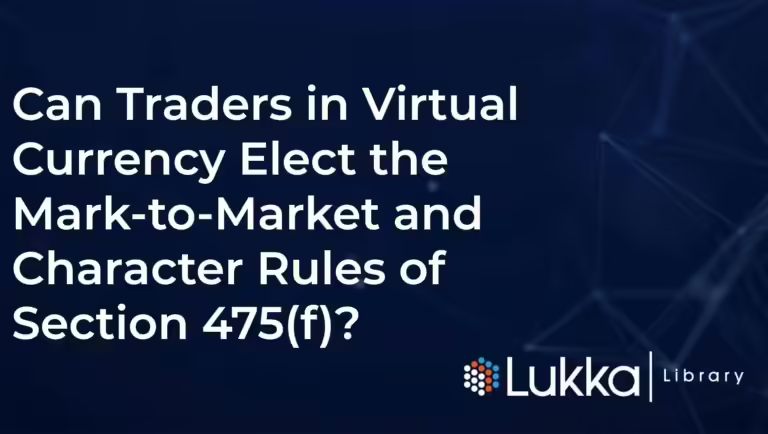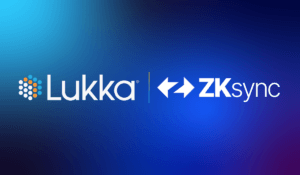Author: Nicholas C. Mowbray a tax attorney, BakerHostetler.1
This communication does not constitute legal advice or an opinion of BakerHostetler. The views expressed in this article are those of the author.
The IRS addressed virtual currencies in Notice 2014-21, noting that for federal income tax purposes, virtual currencies are treated as property. As of the date of this writing, neither this Notice, nor additional IRS guidance discusses whether a virtual currency constitutes a security or commodity for federal income tax purposes. As discussed in this Memorandum, taxpayers may be able to take a position that their virtual currency holdings constitute securities or commodities, and, as a result, the taxpayer may have the ability (provided other criteria is met) to make a section 475 mark-to-market election as a trader of securities or commodities.
Securities and Commodities
The first step in determining if a trader may make a mark-to-market election under section 475 is whether a particular virtual currency qualifies as a security or a commodity.
Under the section 475 rules, the term security is defined to include any: 1) share of stock; 2) partnership or beneficial ownership interest in a widely held or publicly traded partnership or trust; 3) debt instrument; and 4) certain swaps. A security also includes certain derivatives that reference items 1 through 4 and a position that is not itself a security, but that is identified as a hedge of security. As can be seen, the items that qualify as securities under section 475 are carefully defined. It is therefore likely that the IRS will only treat an item as a security if it unequivocally fits into one of these definitions.
In contrast, the term commodity is more broadly defined as any commodity that is actively traded. The term commodities includes physical commodities, derivatives written over a commodity, and evidence of an interest in a commodity. In addition, the IRS, in certain instances, has deferred to whether an item is defined as a commodity by the Commodities Futures Trading Commission.2
There is currently no clear answer with respect to whether the virtual currency is treated as a security or a commodity. Taxpayers should therefore carefully consider whether there are arguments that: 1) their virtual currency positions constitute securities, and 2) their actively traded virtual currency positions constitute commodities.
Trader vs. Investor
In addition to establishing a position that a virtual currency is a security or commodity, a taxpayer must also qualify as a trader in order to make a mark-to-market election. Whether a taxpayer’s activities constitute “trading” as opposed to “investing” is determinative of whether they are eligible to make a mark-to-market election. An investor is generally defined as a taxpayer that seeks to profit from changes in the market price of their holdings, that is, those who attempt to buy low and sell high. Investors anticipate earning a profit from increases in the market value of their long positions and decreases in the market value of their short positions. A trader, in contrast, is generally defined as a taxpayer that seeks to earn a speculative return based on market fluctuations and short-term changes. While both investors and traders act on their own behalves, the key distinction is that a trader is engaged in a trade or business of buying and selling investments, while an investor is passively accumulating earnings by overseeing their investments and is not engaged in a trade or business.3
Making the Election
In addition to the above criteria, a taxpayer must follow certain procedures set forth by the IRS in order to use a mark-to-market method of accounting for its securities or commodities trading activities.4 The election may generally be made without the approval of the IRS. Once made, the election applies to the year in which it was made and all subsequent taxable years. It can only be revoked after seeking the approval of the IRS. To make the election, a taxpayer must:
- Complete a signed statement describing the section 475 election, the first taxable year for which it is effective, and the trade or business for which the election is made;
- Attach the statement to a timely filed federal income tax extension or federal income tax return that is filed on or before the original due date. and
- File an IRS Form 3115 with the taxpayer’s income tax return
A new taxpayer may make the election by placing in its books and records not later than 75 days after the first day of the election year a statement similar to the one noted above. A new taxpayer must also attach a copy of the statement to its original federal income tax return for the year. The deadlines for filing the election are stringent, with no ability to make a retroactive mark-to-market election.
Consequences of Election
A mark-to-market election has several significant U.S. federal income tax consequences, as follows:
- A taxpayer takes into income the unrealized gains and losses from its securities or commodities trading by marking to market their securities or commodities on the last business day of the taxable year, with any gain or loss treated as ordinary income as opposed to long-term or short-term gains/losses.5 This means that the cumbersome process of tracking the date and time that each unit of virtual currency was acquired and specifically identifying the unit of virtual currency that was disposed of, would not be required.
- A taxpayer is no longer subject to certain loss deferral rules that relate to holding offsetting positions in actively traded personal property; and
- Certain rules that treat the character of income from regulated futures contracts and nonequity options (which include Bitcoin futures and Bitcoin options) no longer apply, meaning gain/loss from such contracts is treated as ordinary and not 60% long-term and 40% short-term.
Another important point to consider is that a taxpayer may be able to distinguish and identify certain securities or commodities that have no connection with its trader activities, thus exempting the security or commodity from the mark-to-market rules.
Conclusion
Taxpayers that regularly trade virtual currencies should carefully consider whether there is a position that their virtual currencies qualify as a security or actively-traded commodity, and if so, whether they otherwise qualify for and would benefit from a section 475 mark-to-market election.
1 Baker & Hostetler LLP. Nicholas C. Mowbray is a tax attorney at the law firm of BakerHostetler. This communication may be considered advertising under the rules regulating the legal profession.
2 Rev. Rul. 73-158, 1973-1 C.B. 337. Currently, the Commodities Futures Trading Commission takes the position that Bitcoin and Ethereum are commodities.
3 For a more in-depth discussion of investors and traders, refer to BakerHostetler’s Memorandum “Investors, Traders, and Dealers.”
4 Rev. Proc. 99-17, 1999-1 C.B. 503.
5 For virtual currencies traded on exchanges, a taxpayer may rely on the exchange’s recorded value of the virtual currency.



